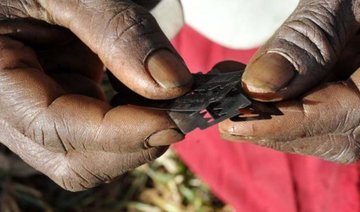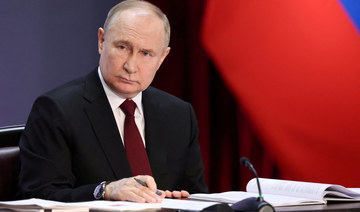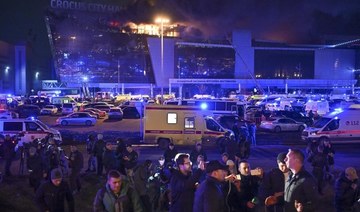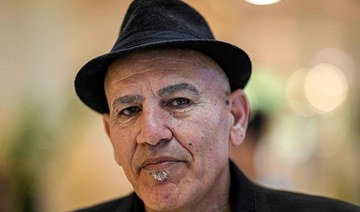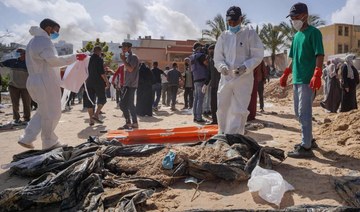DETROIT: Zehra Patwa learned only a few years ago that during a family trip to India at age 7, she was circumcized, which is common for girls in parts of Asia, Africa and the Middle East.
Patwa, 46, doesn’t remember undergoing the procedure, which is also called female genital mutilation or cutting and which has been condemned by the United Nations and outlawed in the US But she doesn’t want to.
“I have no desire to get that memory back. ... Psychologically, it feels like a violation, even though I don’t remember it,” said Patwa, a technology project manager from New Haven, Connecticut, who now campaigns against the centuries-old practice.
The recent arrest of a Michigan doctor accused of performing the procedure on two 7-year-old girls from Patwa’s own Shiite Muslim sect, the Dawoodi Bohra, highlights how female genital mutilation is alive and well in parts of the Western world where its adherents have migrated and formed communities.
Depending on the culture, female circumcisions are performed on girls of various ages and by various methods, and they are seen as a way of controlling a girl’s sexuality, maintaining her purity or even making her more fertile as she grows into adulthood. Critics, though, say it can cause complications during childbirth, make intercourse painful and eliminate any pleasure a woman can derive from sex.
Dr. Jumana Nagarwala is accused of performing the procedure on two Minnesota girls that left them with scars and lacerations. Her attorney, Shannon Smith, insists that Nagarwala conducted a benign religious ritual that involved no mutilation.
Prosecutors on Friday charged two other Bohras, Dr. Fakhruddin Attar and his wife, Farida Attar, with conspiracy. Fakhruddin Attar owns the Detroit-area clinic where the alleged procedures were performed in February, and investigators say the couple knew Nagarwala was doing the procedures after business hours.
There are more than a million Bohras in the world, most of whom live in India. No one knows how many there are in the US, but it’s estimated there are about 25,000 and that they have about 20 mosques and gathering places.
Patwa, who is part of the activist group Speak Out on FGM, said that given its clandestine nature, it’s hard to estimate how many people perform female circumcisions in the US But there are a small number in the Bohra community who are known by elders and tend to be clustered around large cities with Bohra mosques, she said.
When many Bohra girls are age 6 to 8, their parents approach — or are approached by — a “secret network” of female elders about getting the girls cut. There is then an informal vetting process to make sure a request is legitimate and not an attempt to expose any activities, Patwa said.
“Everybody knows somebody who has gotten their daughter cut ... but nobody wants to rat out their family members or friends,” she said.
A spokesman for the Syedna, the Bohras’ religious head in Mumbai, India, could not be reached for comment. The two men vying to succeed the Syedna, his half brother and the son of a former Syedna, have different views on female circumcision. The half brother says it is time to end the practice of female circumcision. The former Syedna’s son, whom most Bohras accept as their new leader, says the tradition must continue and notes that Bohra men are also circumcized.
“Men have to do it, and even women have to do it,” Syedna Muffadal Saifuddin said in a speech last year.
The World Health Organization said the practice of removing or injuring female genital organs has no known health benefits but has been performed on roughly 200 million women and girls in 30 countries.
Multiple Islamic scholars and experts say the practice is cultural, not based in religious principles. Those who don’t have their daughters circumcized are subjected to pressure, and those who do believe they are protecting the girls.
Although Patwa and others describe it as a widespread practice, it’s not universally performed among the Bohra. Sahiyo, a Mumbai-based organization that campaigns against the procedure, estimates that about 80 percent of girls within the community have had it done.
She said she attends a Bohra mosque near Boston, which she describes as a welcoming and largely educated and tolerant congregation, but not one in which the procedure they call “khatna” is openly discussed.
“Part of my campaigning is always, ‘We have a problem within our community. We can only deal with it as a community,” she said. “We can expose it, but other people aren’t going to swoop in and help us.’“
Patwa said many Bohra mosques, including hers, have sent letters to members encouraging them not to engage in khatna because it could be considered illegal. But she said some critics don’t see this as a serious attempt by mosques to end the practice, but rather as legal cover.
Dr. Mohammed Arsiwala, president and CEO of Michigan Urgent Care and a board member of the Michigan State Medical Society, said he was a Bohra until about five years ago. He has shared his concerns about the procedure through a resolution presented to the state medical group, which adopted a policy several years ago labeling it unethical for doctors to perform.
Jiwajee Bhai Bootwala belongs to the Minneapolis-area Bohra community, which he said consists of about 25 to 30 families. He said he doesn’t know of anyone involved in the practice and didn’t know about the families who went to Michigan, or if they even belong to his group. Still, he said, the news will spoil his community’s image.
“The law for the country is part of your faith,” he said. “So we would never do something against the laws of the country.”
Doctor’s arrest brings attention to US female circumcisions
Doctor’s arrest brings attention to US female circumcisions
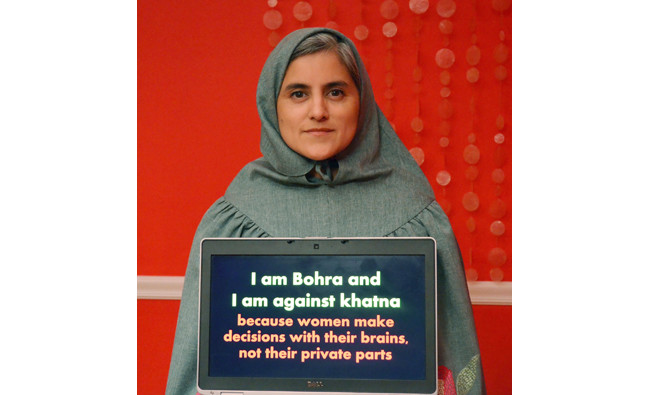
Ukraine suspends consular services abroad for men of fighting age

- Ukraine’s foreign affairs ministry “announced a temporary suspension of accepting new applications for consular services” for men between 18 and 60
- It made an exception for documents allowing Ukrainians to return to Ukraine
KYIV: Ukraine authorities on Tuesday suspended consular services for men of fighting age living abroad, after announcing measures to bring them home amid manpower shortages in the army fighting Russia.
Ukraine’s army has been struggling to hold frontlines, partly due to a lack of soldiers over two years into Russia’s invasion.
Ukraine’s foreign affairs ministry “announced a temporary suspension of accepting new applications for consular services” for men between 18 and 60.
It made an exception for documents allowing Ukrainians to return to Ukraine.
The move would likely oblige Ukrainian men to return from abroad to undergo administrative procedures that were previously available abroad.
The government has already adopted a mobilization law, due to come into force on May 18, that toughens penalties against draft dodgers and obliges men to keep their military registration up-to-date.
The ministry said men would be able to access consular services once the law came into force and “after updating their military registration.”
“Male citizen of Ukraine aged 18 to 60 with valid military registration documents will have full access to consular services,” the ministry said.
Ukrainian men have been forbidden to leave the country since the invasion began, apart from a few exceptions.
But some lived away before the war began, and Ukrainian media estimates that thousands more illegally fled the country.
Major arrests at NYU campus as Gaza protests spread
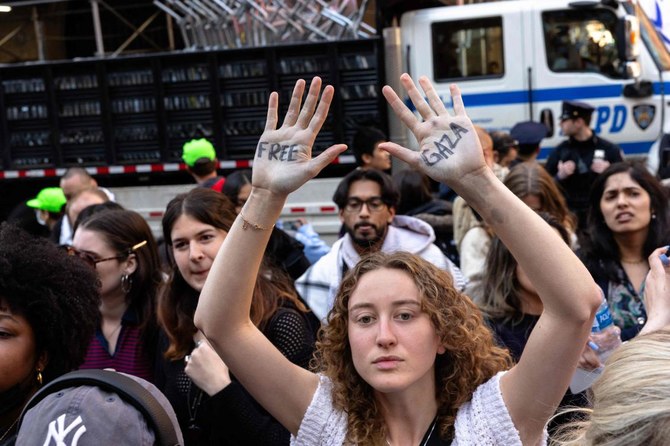
- Some of America’s most prestigious universities have been rocked by protests in recent weeks
- On Tuesday, the New York Police Department said 133 people had been arrested at NYU and released after being issued with court summons
NEW YORK: More than 130 people were arrested overnight during pro-Palestinian protests at the New York University campus, as student demonstrations gather pace in the United States over the Israel-Hamas war.
Some of America’s most prestigious universities have been rocked by protests in recent weeks as students and other agitators take over quads and disrupt campus activities.
The demonstrations come amid sweeping debates over Israel’s assault on Gaza, following Hamas’s deadly invasion on October 7.
Such bastions of higher education — Harvard, Yale, Columbia and others — are grappling for a balance between students demanding free speech rights and others who argue that campuses are encouraging intimidation and hate speech.
On Tuesday, the New York Police Department told AFP that 133 people had been arrested at NYU and released after being issued with court summons, as protests also intensify at Yale, Columbia University and other campuses.
As the holiday of Passover began Monday night, police began detaining demonstrators at an encampment at NYU who had earlier refused orders to disperse.
A New York University spokesman said the decision to call police came after additional protesters, many of whom were not thought to be affiliated with NYU, suddenly breached the barriers erected around the encampment.
This “dramatically changed” the situation, the spokesman said in a statement on the school’s website Monday, citing “disorderly, disruptive and antagonizing behavior” along with “intimidated chants and several antisemitic incidents.”
“Given the foregoing and the safety issues raised by the breach, we asked for assistance from the NYPD. The police urged those on the plaza to leave peacefully, but ultimately made a number of arrests.”
The spokesman said the school continues to support freedom of expression and the safety of students.
But protests have grown large and disruptive enough — New York Police Department spokesmen have spoken of their officers facing violence when confronting protesters at NYU — to draw the attention of President Joe Biden and his administration.
“Anti-Semitic hate on college campuses is unacceptable,” US Secretary of Education Miguel Cardona posted on X on Tuesday, expressing concern about the unrest.
The protests began last week at Columbia University, also in New York, with a large group of demonstrators establishing a so-called “Gaza Solidarity Encampment” on school grounds.
But more than 100 protesters were arrested after university authorities called the police onto Columbia’s campus Thursday, a move that seemingly escalated tensions and sparked a greater turnout over the weekend.
Social media images late Monday appeared to show pro-Palestinian Jewish students holding traditional seder meals inside the protest areas on campuses including at Columbia.
There were also demonstrations at MIT, the University of Michigan, UC Berkeley and Yale, where at least 47 people were arrested Monday after refusing requests to disperse.
France arrests eight in PKK financing probe
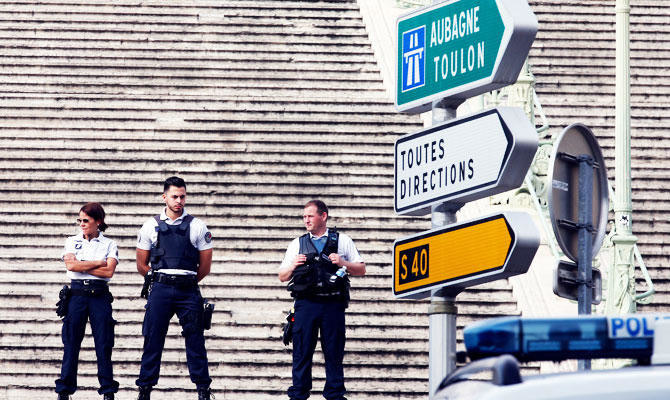
- The arrests took place in the Paris region and in southern France, the PNAT anti-terror unit said
- French prosecutors suspect the eight of preparing and financing terrorist acts
PARIS: French police arrested eight men on Tuesday as part of an investigation into the finances of the Kurdistan Workers Party (PKK), banned as a terror organization by Turkiye and its Western allies, anti-terrorism prosecutors told AFP.
The arrests took place in the Paris region and in southern France, the PNAT anti-terror unit said.
The PKK has been designated a terrorist organization by Turkiye, the United States and the European Union.
French prosecutors suspect the eight of preparing and financing terrorist acts, and of conspiring to extort, or attempt to extort, funds to finance a terrorist organistion between 2020 and 2024, the PNAT said.
Investigators believe the eight to be connected to a campaign to collect funds from Kurdish business people and other Kurds in France, a source close to the case added.
Police can hold the suspects for up to 96 hours for questioning, the source said.
Another source said the funds were destined for use in Belgium, where police on Monday raided Kurdish-run media as part of a probe undertaken at the request of a French anti-terror judge, the PNAT said.
The PKK has waged a decades-long insurgency for greater autonomy for the Kurdish minority of Turkiye in the southeast of the country, in a standoff with the Ankara government that remains unresolved to this day.
Dutch intelligence sees the wars in Gaza and Ukraine as triggers for terrorist threats
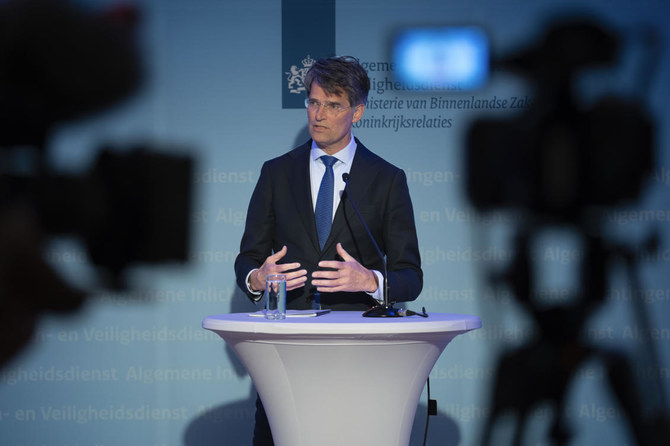
- The Israel-Hamas war in Gaza and the destruction of a Qur’an outside parliament last year are “trigger events” for extremists
- “The terrorist threat is serious at this moment,” the agency’s director-general, Erik Akerboom, told AP
ZOETERMEER, Netherlands: The Dutch national intelligence agency said Tuesday that threats targeting the Netherlands are increasingly connected to worldwide turmoil, including the wars in Gaza and Ukraine.
Although the number of terror attacks across Europe has been down in recent years, the General Intelligence and Security Service in its annual report said the Israel-Hamas war in Gaza and the destruction of a Qur’an outside parliament last year are “trigger events” for extremists.
“The terrorist threat is serious at this moment,” the agency’s director-general, Erik Akerboom, told The Associated Press.
Akerboom said he is particularly concerned about big events, noting that the agency is working closely with French authorities to prevent incidents during the Paris Olympics this summer.
In December, the Dutch counterterrorism agency increased the country’s threat alert to its second-highest level because of concerns about the Daesh group’s Khorasan affiliates, Akerboom said. IS-K, a Central Asian affiliate, was responsible for the attack at a suburban Moscow concert hall that killed at least 133 people in March.
According to the new report, “global jihadism has been the greatest terrorist threat for years in the Netherlands.” Incidents such as the one last April, when an anti-Islam activist tore pages from the Qur’an in front of the Dutch parliament building, put the Netherlands on the map of targets.
About a dozen terror attacks were thwarted by authorities in Europe last year and in four cases, suspects were arrested in the Netherlands, the report said. None of those attacks was focused on the Netherlands, according to Akerboom.
The Dutch also see threats from China, in particular cyberattacks, as a major concern. Akerboom said China is producing more hackers to break into Dutch systems than the Dutch can produce to defend them. The security service has cited China as the biggest threat to the country’s economic security.
Russia also continues to pose a risk to the Netherlands amid Moscow’s full-scale invasion of Ukraine. So-called peace protests in Amsterdam which call for the Dutch to stop sending arms to Ukraine have included demonstrators paid by Russian sources to attend and given prefabricated slogans, the security service has asserted.
The Netherlands is of particular interest to Moscow in part because of the international institutions housed here, including the International Criminal Court. The Hague-based court is investigating crimes in Ukraine and has issued arrest warrants for President Vladimir Putin and other Russians.
Sunak says UK to raise defense spending amid global threats

- “In a world that is the most dangerous it has been since the end of the Cold War, we cannot be complacent,” Sunak told reporters
- The increase in spending from 2.3 percent will see the UK become one of the highest spenders on defense in the 32-member defense alliance
WARSAW: Britain will raise defense spending to 2.5 percent of GDP by 2030 in a “most dangerous” world, Prime Minister Rishi Sunak said Tuesday during a visit to Poland.
The commitment came as NATO countries face pressure to raise defense spending in the face of global threats, particularly from Russia.
“In a world that is the most dangerous it has been since the end of the Cold War, we cannot be complacent,” Sunak told reporters in Warsaw, where he held a press conference with NATO Secretary-General Jens Stoltenberg.
The increase in spending from 2.3 percent will see the UK become one of the highest spenders on defense in the 32-member defense alliance after the United States, the British government said.
It means the UK is expected to spend £87 billion on defense in 2030-31, an increase of £23 billion over current levels.
“I believe we must do more to defend our country, our interests, and our values,” Sunak said, announcing “the biggest strengthening of national defense for a generation.”
Western nations are under pressure to boost defense funding following Moscow’s invasion of its neighbor Ukraine as well as the threat of escalation in the Middle East.
EU chief Ursula von der Leyen recently called for a “European awakening on defense and security.”
Brussels is set to come up with more proposals for financing the defense push by a summit of EU leaders in June.
Sunak has also faced calls from his Conservative Party to boost defense spending, with some calling for a level of three percent of GDP.
On Tuesday, Sunak also announced £500 million additional funding for Ukraine’s war effort against Russia.


